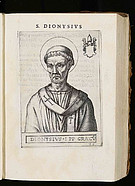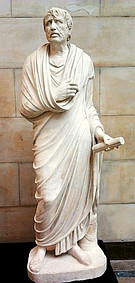Pseudo-Dionysius
Nothing is known of this author except that he used the pseudonym of Dionysius the Areopagite, reported to be a convert of Paul in Athens in Acts 17:34. Perhaps he was of Syrian origin.
Aside from the doubts of a few over the centuries, most of his readers in the Middle Ages regarded him as this person and as such his works exerted considerable influence. The humanists Erasmus and Valla proved that P.-D. relied upon the works of Proclus (412-485) and he was cited by Severus of Antioch by 528 at the latest. So scholars since the Renaissance have inferred he lived in the late 5th perhaps to the early 6th centuries.
He left four crucial works behind: (1) De divinis nominibus, (2) De mystica theologia, (3) De caelesti hierarchia, and (4) De ecclesiastica hierarchia. In (1) he argues that the names of God provide us with symbolic knowledge of God, but that the divine essence is unknowable to us. The names describe God’s activity, not his being—a point stressed by the Cappadocian and Alexandrian fathers. (2) Mystical union of God, given God’s ineffability, consists in human being’s absolute ignorance of him. This idea guided spirituality along the path of theologia negativa and to reach God is to discover darkness—epistemologically speaking. Works (3) and (4) paint a picture of reality in which the structure of creation leads upward, step-by-step to God. This is expressed both, in (3) in the heavenly realm and in (4) in the order of Church government. The goal of these hierarchies is union with God. Knowledge and enlightenment pass downward on the opposite trajectory, descending from God through the various levels of angels in (3) and from God through the church and monasteries in the various levels in (4).
P.-D.’s synthesized Neoplatonist philosophy with Christian theology, providing a model for later Christian thinkers. His spirituality and ecclesiology deeply influenced medieval thinkers, most notably Maximus Confessor and Thomas Aquinas, and many commentaries were composed upon his works.

